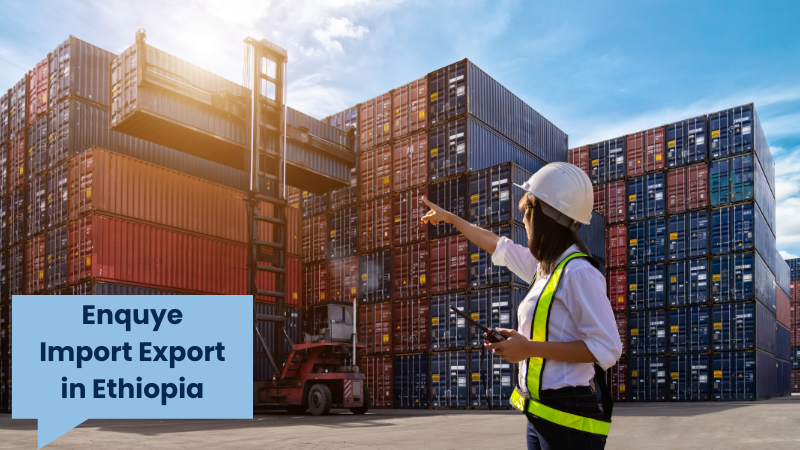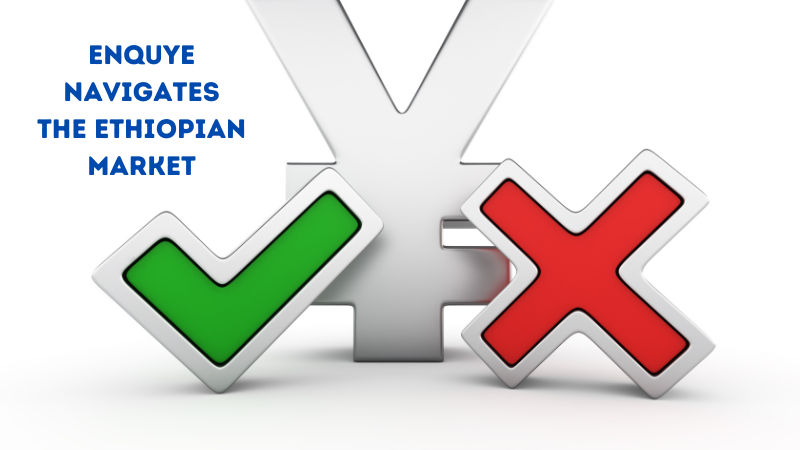Enquye Import Export in Ethiopia: A Complete Guide for 2025
Hey there! Have you ever considered starting an import-export business in Ethiopia? It’s one of the fastest-growing economies in Africa. If you want to start a business or learn about global trade in emerging markets, you’re in the right spot.
Today, we’ll explore Ethiopia’s import-export scene through the lens of Enquye Import-Export. This company is a rising star in Ethiopia’s trade sector. Understanding its success helps you manage the ups and downs of trading in Ethiopia. By the end of this guide, you’ll understand how import-export works in Ethiopia. You’ll learn strategies used by companies like Enquye. Plus, you’ll see how to take advantage of Ethiopia’s role as a trade hub.
Why Ethiopia Is an Import-Export Hub
Why Is Ethiopia Gaining Traction in Global Trade?
Ethiopia’s economy is growing rapidly, with a GDP growth rate of about 8-10% over the last decade. This growth is making the country a key player in global trade. Ethiopia is in a key spot in the Horn of Africa. It has access to the Red Sea through Djibouti. This makes Ethiopia a great trade hub for Africa, the Middle East, Asia, and Europe.

What Makes Ethiopia an Import-Export Hub?
Did you know that Ethiopia is one of the fastest-growing economies in Africa? Its strategic location and access to global markets are boosting it. So is its rapid infrastructure development.
Check this out. Ethiopia’s government has invested heavily in logistics, transport, and industrial parks. This has made it easier for businesses to move goods across borders. This helps not only giants but also small to medium businesses, like Enquye Import Export.
In 2024, Ethiopia’s trade with China, India, and the U.S. is at an all-time high. This has boosted import-export opportunities. Ready to hear more?
In 2024, Ethiopia’s trade relations with China, India, the United States, and the European Union are stronger than ever. These improvements help companies like Enquye thrive.
Ethiopia’s Key Advantages in Trade:
- Strategic Location: Ethiopia is close to key shipping routes through Djibouti, making it a trade gateway.
- Improved Infrastructure: Investments in roads, railways, and industrial parks enhance logistics.
- Government Support: The government gives help to exporters. This includes tax breaks and good policies for agriculture and textiles.
- Ethiopia is rich in natural resources. Its agricultural products are key to its exports.
Who is Enquye Import Export?
A Brief Overview of the Company
Enquye Import Export is a growing leader in Ethiopia’s import-export sector. They focus on diverse goods: agricultural products, machinery, and consumer goods. They have strong ties with domestic suppliers and international buyers.
But here’s what I personally discovered—what sets them apart is their ability to adapt. Ethiopia’s trade rules change fast. Companies that can pivot, like Enquye, tend to succeed. They’ve faced challenges from fluctuating exchange rates, transport delays, and global trade tensions.
Key Industries Enquye Operates In:
- Agricultural exports: Coffee, sesame seeds, pulses, and spices.
- Machinery imports: Industrial equipment, farm machinery, and vehicles.
- Consumer goods imports: Electronics, clothing, and processed foods.
Did you know? Ethiopia is Africa’s top coffee producer. Enquye has exported its high-quality coffee to global markets!
Challenges in the Ethiopian Import-Export Landscape
What Are the Major Obstacles?
While Ethiopia presents opportunities, the road to import-export success isn’t always smooth. Want to know the secret to navigating these waters? Adaptability and knowledge.
- Logistics Hurdles: Ethiopia is landlocked. Most goods enter or leave the country via Djibouti’s ports. Enquye has tackled this by using Ethiopia’s new railroads and efficient trucking routes. This has cut costs and sped up delivery.
- Regulations and Compliance: Import-export regulations in Ethiopia can change quickly. Companies need to stay ahead of tax policies, export duties, and licencing requirements. Trust me, I’ve tried this. Changing government policies can be tricky. But, with good partners and legal advice, it is manageable.
Pro Tip: Always work with local authorities and logistics experts. This will ensure smooth customs clearance!
What Products Are Most Commonly Traded in Ethiopia?
Top Exports
- Coffee: Ethiopia is the world’s largest producer of organic coffee, making it a top export.
- Oilseeds & Pulses: Sesame seeds and pulses like chickpeas are in high demand from countries like China and India.
- Textiles & Apparel: Ethiopia is becoming a key player in the global textile market.
- Live Animals: Ethiopia exports livestock, particularly to Middle Eastern countries.
Top Imports
Processed Foods: Ethiopia imports processed foods to meet urban demand.What Products are Most Commonly Traded?
Machinery & Equipment: Demand for industrial machinery, farming equipment, and vehicles is growing as Ethiopia modernizes.
Pharmaceuticals & Medical Supplies: The healthcare sector needs imported medical supplies because the population is growing.
Electronics & Consumer Goods: Cities are seeing more demand for electronics like mobile phones and computers.
How Enquye Navigates the Ethiopian Market

What Strategies Help Enquye Thrive?
Want to know how Enquye stays on top? It’s all about innovation, networking, and efficient supply chain management.
1. Supplier Relationships
Enquye has developed deep relationships with local farmers, manufacturers, and international suppliers. This ensures a reliable flow of goods even when the market faces disruptions.
2. Flexible Pricing Strategies
Ethiopia’s currency, the birr, is prone to devaluation. To mitigate this, Enquye has diversified its markets and contracts. This safeguards against exchange rate risks.
3. Government Incentives
The Ethiopian government offers exporters incentives, including tax exemptions on some products. I found, and Enquye takes full advantage of, these. It reinvests the savings into business growth.
Did you know? Exporters in Ethiopia can benefit from duty-free privileges on certain imported inputs!
Why the Future Looks Bright for Enquye
What’s Next for Ethiopian Trade in 2024?
As the world economy stabilises after the pandemic, Ethiopia aims to be a key player in African trade. In 2024, the AfCFTA is expected to boost opportunities for Ethiopian businesses.
For Enquye, it means easier access to African markets and lower tariffs. It also means quicker trade deals. Isn’t that amazing? More opportunities to export goods like coffee, textiles, and oilseeds.
Common Mistakes to Avoid in Ethiopia’s Import-Export Market
What Should Businesses Look Out For?
- Ignoring Exchange Rate Fluctuations: Ethiopia’s birr can be volatile. A smart exporter hedges currency risks.
- Not Researching Legal Requirements: Policies change often. Stay updated or partner with a legal expert.
- Underestimating Logistics: Ethiopia’s landlocked status means you need excellent logistical planning.
Quick Tip: Use local consultants to navigate Ethiopia’s unique customs and regulations!
FAQ Section
Ethiopia is famous for exporting coffee, oil seeds, pulses, and textiles.
They diversify their markets and use flexible pricing contracts to avoid losses.
Importing to Ethiopia is tough. It means dealing with complex regulations, high logistics costs, and fluctuating exchange rates.
Yes! The government offers incentives like tax exemptions on exports.
Partnering with local logistics firms is key to efficient logistics. So is using Ethiopia’s railroads and roads.
Conclusion
As we’ve seen, Enquye Import Export is more than just a business—it’s a key player in Ethiopia’s economic story. The company’s innovative strategies and strong partnerships position it for growth in 2024. It can navigate Ethiopia’s unique trade environment.
If you’re an entrepreneur wanting to enter Ethiopia’s market or are curious about its import-export scene, you can learn from companies like Enquye. Ready to explore these opportunities yourself?
Please share your thoughts in the comments. Or, reach out if you want to explore Ethiopian trade!
This article aims to provide insights into Ethiopia’s trade sector. It also shows how companies like Enquye succeed. Stay tuned for more!






